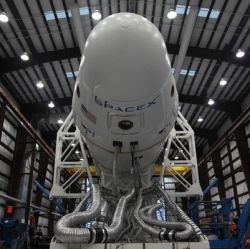
If Spacex fully succeeds then launch costs to orbit could drop to $10 per pound from $4000-20000 per pound. This could open up space to colonization and industry and enable the economy of civilization to expand by trillions of dollars in decades and enable large scale expansion into the solar system much the way nationwide highway and rail allowed the US to fill out from coast to coast.
If Tesla Motor fully succeeds then the electric car could become displace gasoline cars on a global and set the stage for mainstream electric airplanes and other vehicles.
If Broad Groups factory produced skyscrapers fully succeed the cost of building construction could drop two to ten times. This will changes cities and world urbanization and the $4 trillion world construction market.
Spacex fight for Government and Military launches and to displace expensive competitors
Spacex with a successful reusable rocket has the potential to completely disrupt all space access competitors except those who launch national strategic payloads (Russian, Chinese military for example.) Already Spacex has the lowest cost commercial launch capacity. The Spacex Heavy will launch next year and will be able to launch over 53 metric tons and some launch configurations and missions would have a cost of $84 million or $709 per pound.
As of March 2013, Falcon 9 v1.1 launch prices are $4,109 per kilogram ($1,864/lb) to low-Earth orbit when the launch vehicle is transporting its maximum cargo weight.
Elon Musk has stated that he can get launch costs below $500 per pound of delivered payload without reusability. If reusability is achieved then the costs would go down by about half with a reusable first stage and having all stages reusable would lower costs by ten to one hundred times. Attempts to have full stage launch recovery could occur by 2015. There would be an attempted wet soft landing of a stage next year and then an actual dry landing in 2015.
In June 2013, Space Exploration Technologies Corp. (SpaceX) signed a certification agreement with the U.S. Air Force Tuesday that moves the company one step closer to competing for contracts to launch sensitive national security satellites. Those satellites are all launched now by United Launch Alliance rockets.
United Launch has been trying to use political and regulatory means to block competition with Spacex. They also try to get media stories to focus any concerns about Spacex safety and use its nontraditional approach as an argument against it.
